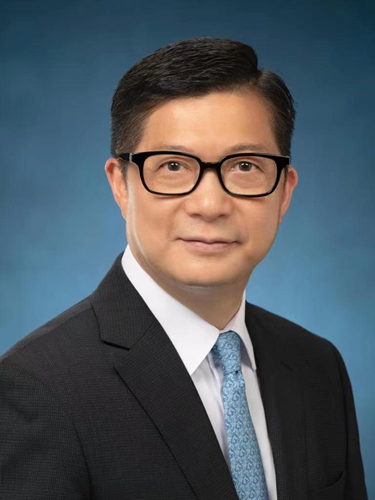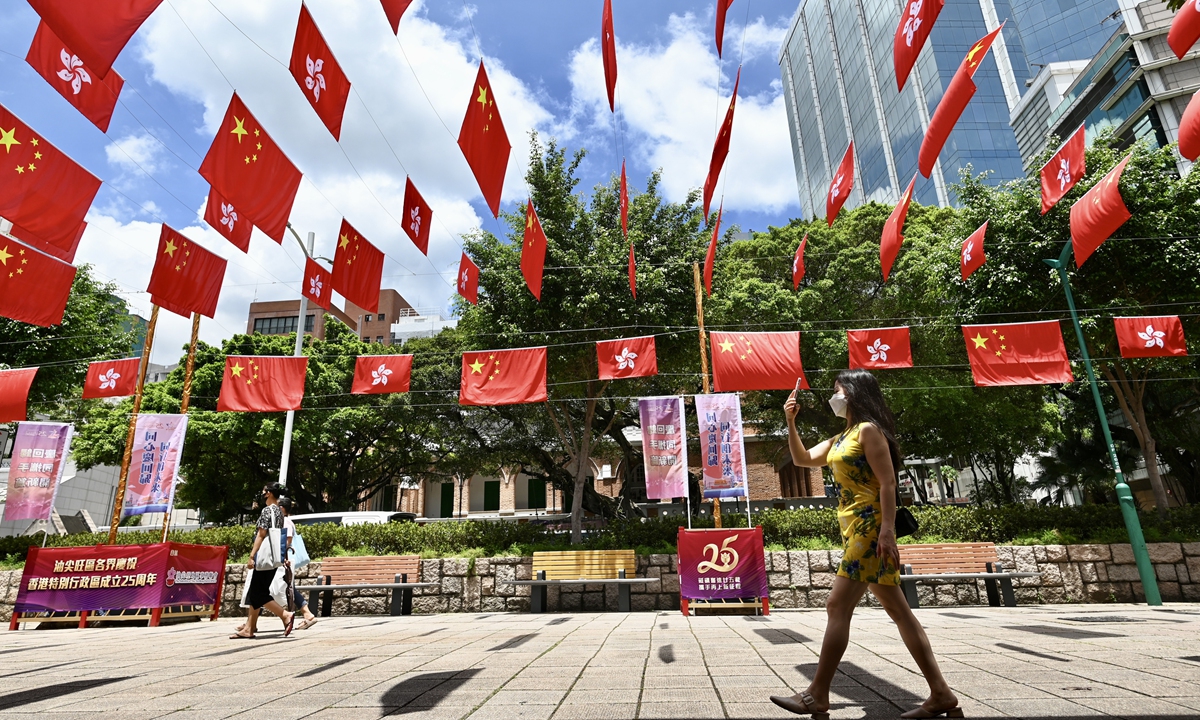Editor's Note:On the day marking the 25th anniversary of Hong Kong's return to the motherland, some officials of the sixth-term Hong Kong Special Administrative Region (HKSAR) government will be sworn in. Recently, China's State Council approved the list of key officials proposed by the sixth-term chief executive of the HKSAR government, and veteran official Chris Tang Ping-keung will continue serving as Secretary for Security. Global Times reporters Chen Qingqing and Fan Lingzhi recently interviewed Tang exclusively. With the implementation of the national security law for Hong Kong, the city has seen a transition from chaos to stability. However, Tang warned there are still risks that the city faces in national security, and that public awareness and youth education concerning national security should be further strengthened.

Chris Tang Ping-keung Photo: Courtesy of Tang
GT: What have been your work priorities since you became Secretary for Security and what are your future plans? Tang: Over the past year, the Security Bureau, along with the Hong Kong Police Force and other Discipline Services, engaged in a series of law enforcement activities on individuals and organizations endangering national security, including arrests and prosecutions, activating existing legislation, and freezing the properties tied to crimes. We successfully cracked down on a number of criminal activities endangering national security and security of Hong Kong. Since the national security law for Hong Kong took effect, a total of 189 individuals have been arrested by the police for endangering national security, and among them 122 have been prosecuted. Also, five enterprises have been prosecuted.
The black-clad violence in 2019 fostered homegrown terrorism. The police have cracked over 20 cases involving firearms and explosives, and the HKSAR government has been expanding its capabilities to fight terrorism, advancing public education, and setting up the counter-terrorism report line in order to counter potential risks in communities and enhance residents' counter-terrorism awareness.
The national security law for Hong Kong helped the city's transition from chaos to stability. The number of criminal cases recorded in the first quarter of 2022 dropped 6.2 percent year-on-year, among which the cases related to violence dropped 10 percent, and robbery cases dropped 23.3 percent - both hitting a record low in recent years.
In the future, the Security Bureau and Discipline Services will continue safeguarding national security, actively pushing forward Article 23 legislation of the Basic Law and working on cybersecurity legislations in defining network security responsibilities of critical infrastructure operators.
GT: Do you think national security risks will persist after the implementation of the national security law for Hong Kong and the electoral system reform? Tang:With the development of China, some Western countries take China as a threat and even adopt a full-scale hostile attitude. Given the unique environment and lifestyle in Hong Kong under the "one country, two systems," some hostile external forces could easily infiltrate, attempting to divide and subvert the country. Those forces also cultivate and advocate for "Hong Kong independence," making the national security risks more apparent.
Due to the incompletion of Article 23 of the Basic Law, the HKSAR has seen growing national security risks over the past decades. In 2014 for example, there was the illegal "Occupy Central" movement and the Mong Kok thereafter in 2016. The "Hong Kong National Party" that advocated for "Hong Kong independence" also seriously compromised public order and national security. Until 2019, we saw large-scale riots that lasted for over 10 months reaching the limits of the rule of law and public order, which seriously endangered national security.
The implementation of the national security law for Hong Kong changed the chaotic situation since 2019 as the number of violent activities and those advocating for "Hong Kong independence" largely dropped. A number of organizations allegedly endangering national security were successively dissolved or ceased operation. Although the law shows a deterrence effect, those who attempted to endanger national security won't easily give up but will wait for opportunities.
Hong Kong still faces some national security risks including some forces endangering national security and the security of Hong Kong in a continued "soft confrontation" by spreading anti-central government and anti-HKSAR government information in advocating for "Hong Kong independence." In 2021, there was a lone-wolf style attack against the police and some intended to plant bombs in public places such as railway and courthouses, which all showed that local terrorists and external forces constantly interfered with and smeared the HKSAR's affairs by using the high degree of autonomy. Some figures fled overseas and continued engaging in activities endangering China's national security. For example, they ask for foreign sanctions on the city and the country.
GT: What will be the response toward these remaining national security threats? Tang: The HKSAR government will continue taking a series of measures to deal with those risks, particularly in the following aspects. In terms of intelligence, we will enhance cooperation with the national counter-terrorism services in information collection and analysis, paying special attention to online information. In law enforcement, we will conduct in-depth investigations on individuals and organizations that allegedly endanger national security, particularly on their financial revenues, spending, and ties to foreign forces. We will conduct comprehensive coordination with all Discipline Services, bureaus, and departments in jointly safeguarding national security.
In legislation, we will complete Article 23 of the Basic Law and the cybersecurity law as steps to further improve legislation in safeguarding national security. In education, we have to increase public awareness, especially among the youth, about national security. The education on national security has to be rooted in local schools, and the Discipline Services will help foster the good quality of the Hong Kong youth in following the rule of law and recognizing their national identity.
The relevant policy bureaus and departments of the HKSAR government have also actively established other new laws, regulations, and mechanisms to better fulfill their responsibilities in publicity, guidance, supervision, and management in terms of safeguarding national security. The Registration of SIM Cards Regulation, for example, aims to ensure telecommunication network security. The Film Censorship (Amendment) Ordinance 2021 and the updated Film Censorship Guidelines for Censors came into effect, including national security as one of the considerations for film screening. Authorities also revised the tax guidelines applicable to charities. If any group supports, promotes, or engages in activities against national security, the tax bureau will no longer identify such activities as a charitable group and will revoke the exemption from tax payments granted under the Inland Revenue Ordinance. Also, activities endangering national security were included in the Social Workers Registration Ordinance; anyone who is convicted of any crime against national security cannot serve as a registered social worker.

China's national flag and the flag of Hong Kong Special Administrative Region hanging over the streets in Hong Kong on June 17, 2022 Photo: VCG
GT: What is the current progress of the legislation of Article 23? With the national security law for Hong Kong, do we still need Article 23? You mentioned earlier that the legislation of Article 23 will refer to similar British laws. What's the purpose and what other laws will be included for reference? Tang: The HKSAR government has been pushing Article 23 legislation and relevant work forward. Among the seven crimes prohibited by Article 23, two items - divide the country and subvert the power of state - have been covered by the national security law for Hong Kong, but other crimes are only partially covered by the Crime Ordinance, the Official Secrets Ordinance, and the Social Workers Registration Ordinance. So the legislation of the Article 23 is necessary.
We are studying past, present, and even future security risks facing the HKSAR for what has happened in the past, and also examining the experience of the national security law for Hong Kong and relevant court rulings and existing laws to develop effective and pragmatic programs and provisions to address potential risks.
In fact, most jurisdictions have their national security laws that share some similarities. They have broad enforcement powers to enforce their national security laws, for example, and are an international practice. Most countries have laws on espionage and many others have laws on foreign intervention. The UK National Security Bill has either reformed or introduced related crimes.
To improve our capabilities in safeguarding national security, we will refer to similar laws in other jurisdictions. Some countries with laws covering similar areas of crimes, including the UK, the US, Australia, Canada, New Zealand, Singapore, and so on, are included in our reference list, with the aim of developing a plan best tailored to the actual situation in Hong Kong.
GT: What are the cooperation plans between the HKSAR government and relevant authorities in the mainland in safeguarding national security? Tang: We will strengthen information and intelligence sharing and exchanges with different institutions in the country, and crack down on crimes endangering national security in an intelligence-based manner.
GT: In the past two years, some Hong Kong rioters who had fled overseas and some residents who immigrated abroad have been reported to be living poorly abroad. What do you want to say to them? Tang: Some people even continue to act as foreign agents to discredit and violate the law on different matters. The HKSAR government will investigate their criminal responsibility in accordance with the law and ensure that those who break the law face legal consequences.
I hereby appeal to the people concerned not to continue the behavior of these traitors and cowards, but to "back off" from the cliff and discontinue their mistakes. Otherwise, they will be fugitives and law enforcement authorities will eventually hold them accountable.
As for the people of Hong Kong who immigrate abroad, I think it is a very personal choice whether to immigrate or not, but I believe that most people who love Hong Kong and the country will choose to stay in Hong Kong and contribute to the society.





